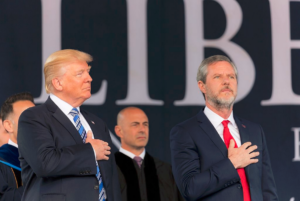Jerry Falwell Jr. Supports Autocracy over Democracy
 Jerry Falwell Jr. and President Trump at Liberty University's commencement ceremony in 2017. (Image via WhiteHouse.gov)
Jerry Falwell Jr. and President Trump at Liberty University's commencement ceremony in 2017. (Image via WhiteHouse.gov) Jerry Falwell Jr., the president of the religious right-aligned Liberty University, has followed in his father’s footsteps by leveraging his considerable flock for his own partisan and personal gain. Falwell Jr. was one of the first to endorse then-candidate Trump, and he provided some moral cover for Trump following the Access Hollywood scandal, stating,
We’re all sinners, every one of us. We’ve all done things we wish we hadn’t…I don’t think the American people want this country to go down the toilet because Donald Trump made some dumb comments on a videotape eleven years ago.
This extremely permissive statement about marriage fidelity was surprising given that Falwell and his father gained much of their political power working in “defense of traditional marriage” by opposing marriage equality laws across the country, in Congress, and before the Supreme Court. But while Falwell Sr. always masked his activism as part of an effort to restore foundational democratic principles of America and encourage civic participation of a supposedly silenced religious majority, Falwell Jr. seems content to destroy democratic traditions in his insatiable lust for power and influence.
Last week he tweeted: “I now support reparations—Trump should have 2 yrs added to his 1st term as pay back for time stolen by this corrupt failed coup.” The president soon retweeted this message, adding
Despite the tremendous success that I have had as President, including perhaps the greatest ECONOMY and most successful first two years of any President in history, they have stollen two years of my (our) Presidency (Collusion Delusion) that we will never be able to get back.
While many have rightly focused on Falwell’s upsetting dog whistle regarding reparations (in which he seeks to ridicule the legitimacy of the reparations movement while co-opting its terminology for his own sectarian purposes), it’s important that Americans don’t miss the larger message: Falwell is more than willing to undermine whatever democratic institutions, traditions, and regulations he thinks stand in the way of his chosen politician and political agenda.
Let’s not mistake this proposed change with other institutional changes that are being discussed at the moment. Many Democrats and Republicans have spoken about removing the filibuster in the Senate, which could potentially lead to the Senate becoming more partisan than it already is. This change is concerning, but the filibuster is not constitutionally mandated. It’s simply a legislative practice that can be done away with either at the beginning of a new congressional session or as a unilateral action during congressional session.
Changing the length of presidential terms (and for a sitting president) would not only require a constitutional change, but would drastically alter the nature of the presidency and American politics more generally. Would past presidents be entitled to additional time because they endured investigations or political actions deemed to be unfair by partisan actors? (Obama’s birth certificate allegations come to mind, as does the Benghazi congressional investigation.) Would Congress be reluctant to carry out their constitutionally mandated oversight responsibilities so as to prevent the president from seeking an extension of their term? What would be the standards for an extension, and what would prevent a party that has control over the legislature and executive (like Democrats had in 2009 and Republicans had in 2017) from simply deciding to extend the president’s term for partisan reasons?
The fact that Falwell would post this remark publicly is concerning, because it shows that he doesn’t feel the need to pretend he supports democratic principles, regardless of what he says privately as part of his advocacy work. Ultimately, what Falwell seems to want is a presidency with the moral legitimacy of democracy but without any of the necessary limitations or pesky congressional oversight. Such a position is fundamentally un-democratic and must be opposed by Americans of all political backgrounds and beliefs.
